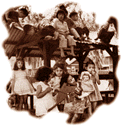

 When she plays make-believe with her friends, they pretend to be teachers,
astronauts, dancers, mothers and fathers, and even scientists. These
girls and boys enjoy their games so much that they consider following some
of those careers. Boys often think of the heroic jobs, such as military
service, firefighters, or policemen, while many girls dream of dancing in
a famous musical or teaching grade school. But not this little girl, she
imagines herself winning a Nobel prize in science as Marie Curie did in
1903.
When she plays make-believe with her friends, they pretend to be teachers,
astronauts, dancers, mothers and fathers, and even scientists. These
girls and boys enjoy their games so much that they consider following some
of those careers. Boys often think of the heroic jobs, such as military
service, firefighters, or policemen, while many girls dream of dancing in
a famous musical or teaching grade school. But not this little girl, she
imagines herself winning a Nobel prize in science as Marie Curie did in
1903.
As she finishes elementary school, she begins to realize that only a few of her friends enjoy science and math as much as her. While other girls take ballet lessons, she stays home to work with model sets. Her male peers often talk to her about the chemistry set she owns or her model planes; this earns her disapproving looks from other females. She feels the beginning of peer pressure, the first obstacle she will have to overcome on her way to earning that Nobel prize.
Science classes in junior high school just are not the same as they were in elementary, she discovers. More of the teachers are male, and many of the invited speakers are also male. This male atmosphere suppresses her and her other female peers, but it seems to empower the males. The boys always raise their hands to answer questions, and their male teachers call upon them eighty percent of the time no matter how many girls raise their hands. Thus, the girls become less likely to raise their hands to answer questions or volunteer. Maintaining an avid interest in a scientific career is extremely difficult for this little girl, but she perseveres and still wants that Nobel prize.
High school presents the final challenge before college. By the time this young woman reaches this hurdle, she has realized that it will be difficult for her to stay true to her desire and get her Ph.D. in chemical engineering. Most of her friends that originally wanted careers in scientific disciplines have switched to the liberal arts. To get through high school, she must withstand even more male teachers and speakers and now female liberal arts teachers that try to persuade her to become more feminine and to shy away from the sciences. Also, young men seem to essentially run the labs in science class, preventing the females from obtaining more hands-on experience in the sciences.
 Although she has had very few female role models the last seven years,
this young woman still dreams of being awarded a Nobel prize for her
scientific research. She has overcome the overbearing male atmosphere in
her science classes and labs, the female liberal arts teachers trying to
sway her, and peer pressure from other females. College and graduate
school will prove difficult, but she believes that she can make it in the
world of science. In college, she hopes that she will find at least a few
other females that also want to succeed in science.
Although she has had very few female role models the last seven years,
this young woman still dreams of being awarded a Nobel prize for her
scientific research. She has overcome the overbearing male atmosphere in
her science classes and labs, the female liberal arts teachers trying to
sway her, and peer pressure from other females. College and graduate
school will prove difficult, but she believes that she can make it in the
world of science. In college, she hopes that she will find at least a few
other females that also want to succeed in science.
 Main |
 College |
 The Future |